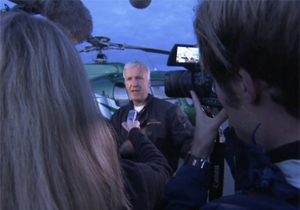Nature of Things doc tackles the Tipping Point

When it comes to the rhetoric surrounding big oil in Western Canada, supporters and detractors identify themselves by the name they give the world’s second largest source of the black stuff, with two million barrels produced per day.
“You’re either on one side of the debate or the other with these terms,” says Niobe Thompson, co-director of the documentary Tipping Point: The Age of the Oil Sands. “Ever since the tar sands were re-branded as the oil sands, you identify yourself as a friend or an enemy of the industry depending on the term you use. There’s no middle ground.”
By using ‘oil sands’ in the title of his two-hour documentary, which airs Jan. 27 on CBC’s The Nature of Things, the Clearwater Media owner says he’s reaching out to start a conversation about the adverse environmental impact of open-pit oil mining in Alberta, which employs 45,000 people, making it the Canadian province’s key economic driver.
Thompson hopes that Tipping Point will also focus that conversation around newly-released scientific research by University of Alberta professor Dr. David Schindler, who found cancer-causing pollutants in the Athabasca River upstream from the oil sands. Released last fall, his report contradicted claims to the contrary by the Canadian government and an industry-backed water monitoring program.
Though many filmmakers have explored the social, political and economic effects of the Alberta oil sands – including Clearwater’s 2008 film Tar Sands, The Selling of Alberta – Thompson and co-director Tom Radford had exclusive access to Schindler as he undertook his top secret research and were able to use their experience filming the region to film in Fort Chipewyan, an Aboriginal community on the Athabasca River.
Their cameras were the only ones present when Schindler presented his findings to the community. The directors also had access to Avatar director James Cameron as he made a much-publicized trip to Alberta to survey the oil sands and draw attention to Fort Chipewyan’s higher-than-normal cancer rates.
“This is not the first documentary that’s been made about Fort Chipewyan and the issues it’s facing. There’s been a lot of press in general, so there’s a real sense of exhaustion,” says Thompson. “It was important for us to develop a relationship with the community before we could have access to these moments.”
The film places the research in the context of a wider PR war between big oil and environmental groups and Canada’s newly-minted reputation as an obstacle in the global effort to curb carbon emissions. Production began in late 2008 and lasted until December, 2009 and included a trip to the Copenhagen Climate Conference in 2009.
Thompson and Radford pitched the film at the International Documentary Festival Amsterdam (IDFA) in 2009 and secured broadcast partners Al-Jazeera English, SVT, NRK, NHK and Documentary Channel. Following the Canadian premiere on CBC, they’ll re-cut an international version of the film that focuses less on federal-provincial politics in Canada and more on the effects of the global dependency on oil.
Buyers at IDFA were especially interested how the film pulls the curtain back on Canada’s role as one of the world’s top polluters.
David Suzuki, the film’s narrator and The Nature of Things host, says this of the project: “My focus is really on the Canadian public. I’ve always seen The Nature of Things as the vehicle to get things out so people can make more informed decisions. We think of ourselves as the environmental good guys in the world and we’re not. If you see some of the footage from Copenhagen at the last climate conference it really is humiliating.”

 The definitive CDN broadcast and production resource.
The definitive CDN broadcast and production resource.










